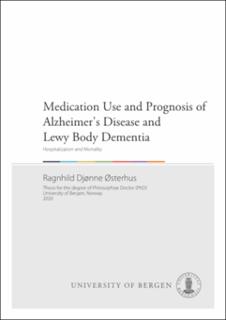Medication Use and Prognosis of Alzheimer's Disease and Lewy Body Dementia : Hospitalization and Mortality
Doctoral thesis
Permanent lenke
https://hdl.handle.net/1956/24156Utgivelsesdato
2020-10-30Metadata
Vis full innførselSamlinger
Sammendrag
Background: There is no curative treatment available for the cause of dementia, and few drugs are approved for symptomatic treatment. In addition, knowledge about prognosis related to hospitalization and mortality is scarce in patients with dementia. This is especially true for patients with dementia with Lewy bodies and Parkinson’s disease dementia. They have many of the same clinical and pathological features and are often referred to as Lewy body dementia. Aim: To increase knowledge about pharmacological treatment and prognosis related to hospitalization and mortality in patients with mild Alzheimer’s disease and Lewy body dementia. Methods: Analysis of data from the DemVest study, a longitudinal cohort study in Western Norway. From March 2005 until April 2007 all consecutive referrals to secondary care outpatient clinics in geriatric medicine and old-age psychiatry with mild dementia were asked to participate. From April 2007 to 2013, only patients with Lewy body dementia were included. The consensus criteria for dementia with Alzheimer’s disease, dementia with Lewy bodies and Parkinson’s disease dementia were used to set the final clinical dementia diagnosis. The baseline assessment included the recording of present drug treatment, demographic and clinical data assessment of comorbidity and cognition, and a battery of other neuropsychological tests.
Results: Patients with LBD were found to have a significantly shorter time until first hospitalization, more days in the hospital and a shorter survival time after diagnosis compared to AD. Apart from the use of antidementia drugs, 45% of the patients used at least one psychotropic drug; polypharmacy was also identified in 45% of the patients. Few potentially inappropriate medications (n=48) and severe drug-drug interactions (n=4) were identified. Conclusion and clinical implications: Having Lewy body dementia was associated with a higher risk of hospitalization and mortality. Polypharmacy and psychotropic drug use were common in mild dementia, but were not found to be associated with hospitalization or mortality. Early diagnosis of dementia may provide opportunities for more streamlined care and appropriate drug use which in turn can potentially improve the prognosis of patients with dementia.
Består av
Paper I: Oesterhus, R., et al. (2017). "Potentially inappropriate medications and drug-drug interactions in home-dwelling people with mild dementia." International Journal of Geriatric Psychiatry 32(2): 183-192. The article is available in the main thesis. The article is also available at: https://doi.org/10.1002/gps.4456Paper II: Oesterhus, R., et al. (2020). "Risk of Hospitalization in Patients with Alzheimer's Disease and Lewy Body Dementia: Time to and Length of Stay." J Alzheimers Dis 74(4): 1221-1230. Full text not available in BORA due to publisher restrictions. The article is available at: https://doi.org/10.3233/JAD-191141
Paper III: Oesterhus, R., et al. (2014). "Long-term mortality in a cohort of home-dwelling elderly with mild Alzheimer's disease and Lewy body dementia." Dementia and Geriatric Cognitive Disorders 38(3-4): 161-169. Full text not available in BORA due to publisher restrictions. The article is available at: https://doi.org/10.1159/000358051
